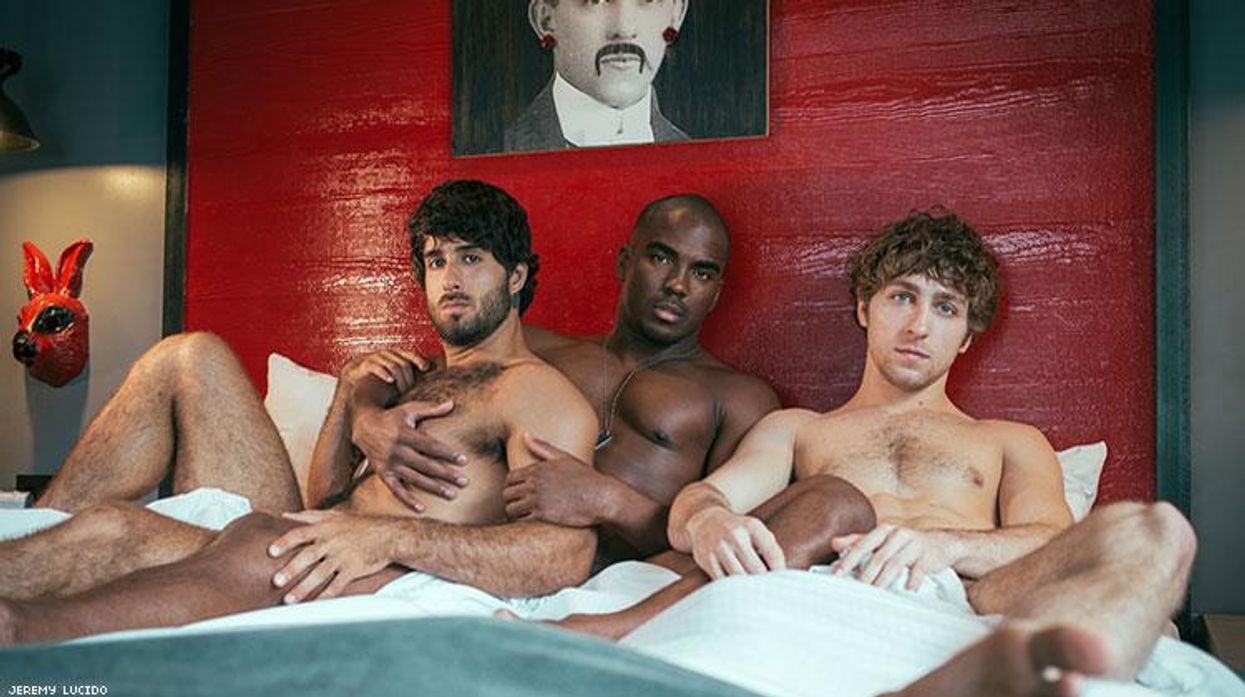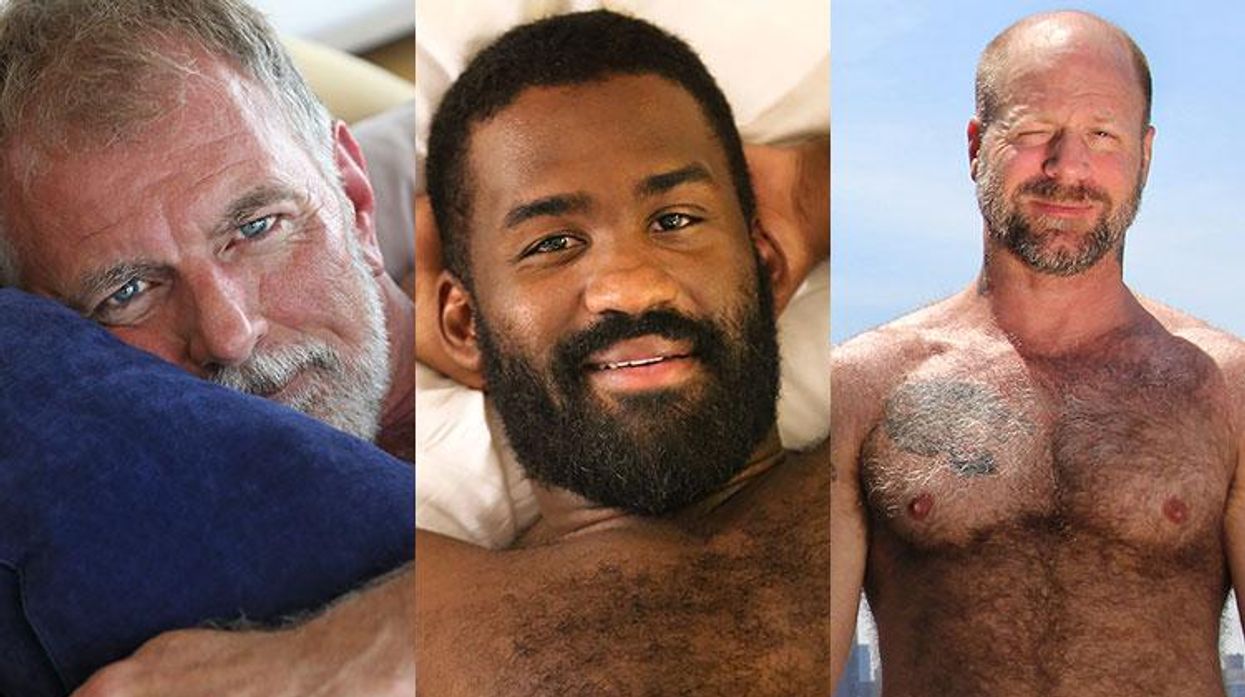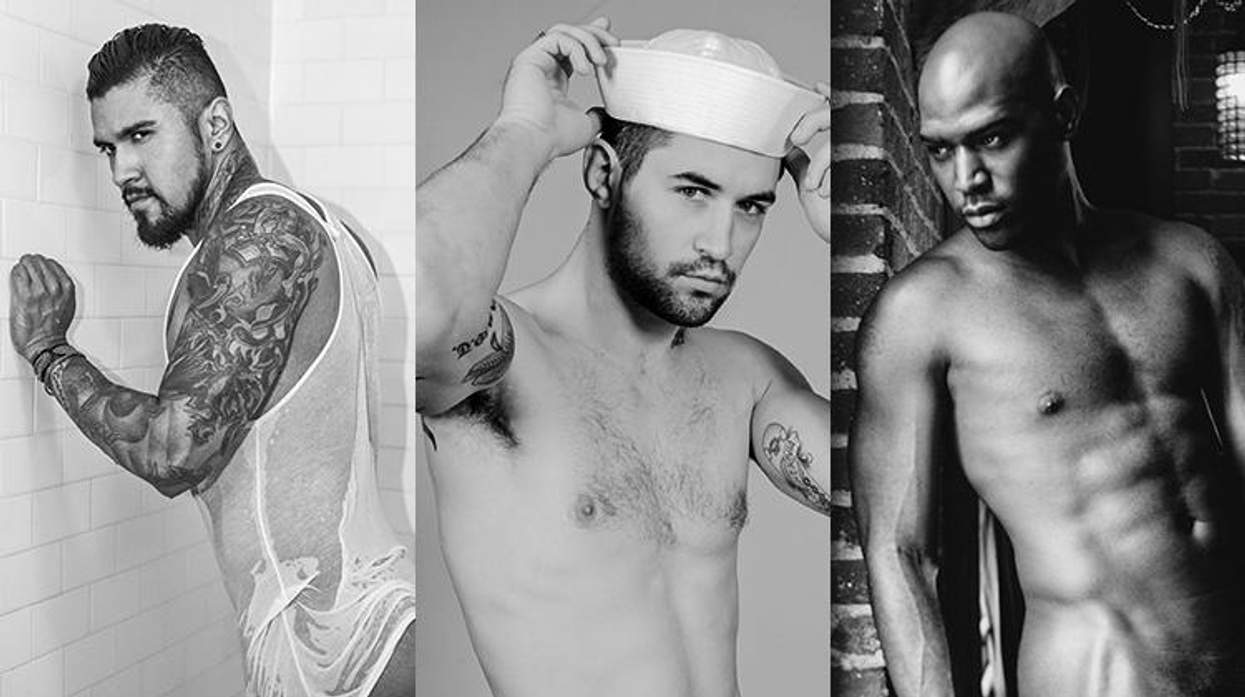These are the 15 worst states for LGBTQ+ people
 Black cowboy at Oklahoma Pride (L); Pride float with young Black people in Oklahoma (M); Mourners at Pulse Nightclub memorial in Florida (R)shae cardenas / Shutterstock.com; Kit Leong / Shutterstock.com; Chris_Harris / Shutterstock.com
Black cowboy at Oklahoma Pride (L); Pride float with young Black people in Oklahoma (M); Mourners at Pulse Nightclub memorial in Florida (R)shae cardenas / Shutterstock.com; Kit Leong / Shutterstock.com; Chris_Harris / Shutterstock.comA lot of states are passing laws that target the LGBTQ+ community — but these 15 are the absolute worst.
Over 1,000 anti-LGBTQ+ laws have been proposed across every state legislature in the U.S. over the past two years, according to the American Civil Liberties Union, and 126 have passed into law. Less than two months into the 2025 legislative session, 390 laws targeting LGBTQ+ people have been proposed.
While marriage equality and anti-discrimination protections based on sexual orientation and gender identity are still guaranteed federally by U.S. Supreme Court rulings (for now), LGBTQ+ people are still concerned about their rights being taken away, especially when only 15 states have "shield laws" protecting access to gender-affirming care and abortion.
Based on laws surrounding marriage, family rights, health care, education, and youth collected by the Movement Advancement Project, here are the 15 worst states for LGBTQ+ people.
Related: What states are the best for LGBTQ+ people? These are the top 15
Alabama
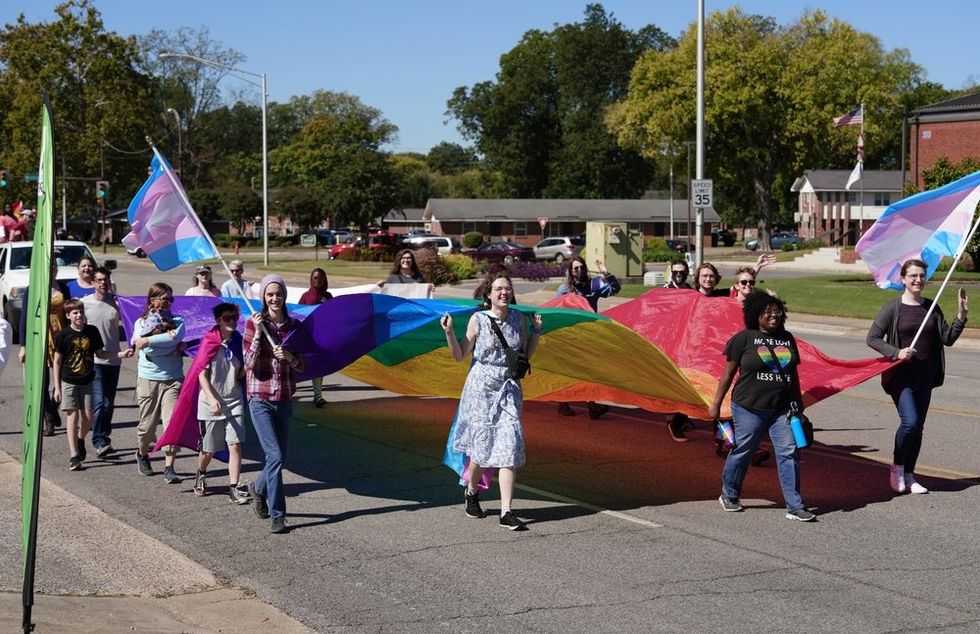
Pride Parade in Huntsville, Alabama (October 1, 2022)
Katssoup / Shutterstock.com
Nondiscrimination laws: Alabama does not have nondiscrimination laws in employment, housing, health care, education, public accommodations, or credit/lending. Its state code incorrectly defines sex as exclusively male or female, and it prohibits transgender people from using public facilities that align with their identities.
Marriage equality and parental rights: Alabama does not have adoption or foster care nondiscrimination protections for LGBTQ+ parents. It does not have second-parent adoption for unmarried couples, confirmatory adoption, nor recognition for parents using assisted reproductive technologies. It also does not have family leave laws that encompass LGBTQ+ people.
Education and youth policies: Alabama has a "Don't Say Gay" law restricting discussion of LGBTQ+ identities in classrooms. It has banned trans students from participating in sports or using school facilities based on their identities, and it requires staff to forcibly out LGBTQ+ students to their guardians. The state also has a "religious exemption" law for Child Welfare Services.
Healthcare access and rights: Alabama has banned life-saving gender-affirming care for youth, though it permits the discredited and harmful practice of so-called conversion therapy for youth. Health insurance companies, including Medicaid, are not required to provide coverage related to gender transition or fertility treatments. The state also has a "religious exemption" law for healthcare providers.
Criminal justice: Alabama's hate crime laws do not encompass sexual orientation and gender identity, and it has not banned the so-called "LGBTQ+ panic" defense.
Arkansas
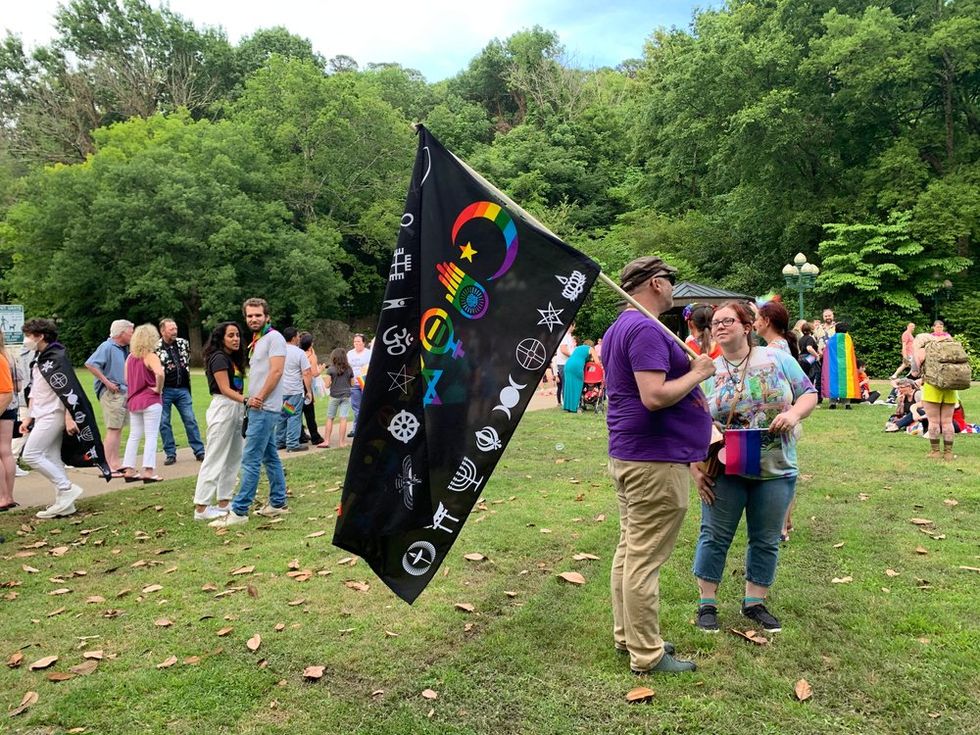
3rd annual Pride Walk at Hot Springs National Park, Arkansas (June, 4 2021)
Danielsen_Photography / Shutterstock.com
Nondiscrimination laws: Arkansas does not have nondiscrimination laws in employment, housing, health care, education, public accommodations, or credit/lending. The state bans cities and local ordinances from passing nondiscrimination laws, and it has law about "adult" performances that could be used to target or restrict drag.
Marriage equality and parental rights: Arkansas does not have adoption or foster care nondiscrimination protections for queer parents or children, allowing anti-LGBTQ+ parents to foster LGBTQ+ children. It does not have second-parent adoption for unmarried couples, confirmatory adoption, nor recognition for parents using assisted reproductive technologies. It also does not have family leave laws that encompass LGBTQ+ people.
Education and youth policies: Arkansas has a "Don't Say Gay" law restricting discussion of LGBTQ+ identities in classrooms. It has banned trans students from participating in sports or using school facilities based on their identities, and it requires staff to forcibly out LGBTQ+ students to their guardians.
Healthcare access and rights: Arkansas has banned life-saving gender-affirming care for youth, though it permits the discredited and harmful practice of so-called conversion therapy for youth. Medicaid is forbidden from providing coverage related to gender transition to minors, and insurance companies are not required to cover fertility treatments. The state also has a "religious exemption" law for healthcare providers.
Criminal justice: Arkansas' hate crime laws do not encompass sexual orientation and gender identity, and it has not banned the so-called "LGBTQ+ panic" defense. It has an HIV criminalization law that may require sex offender registration.
Florida
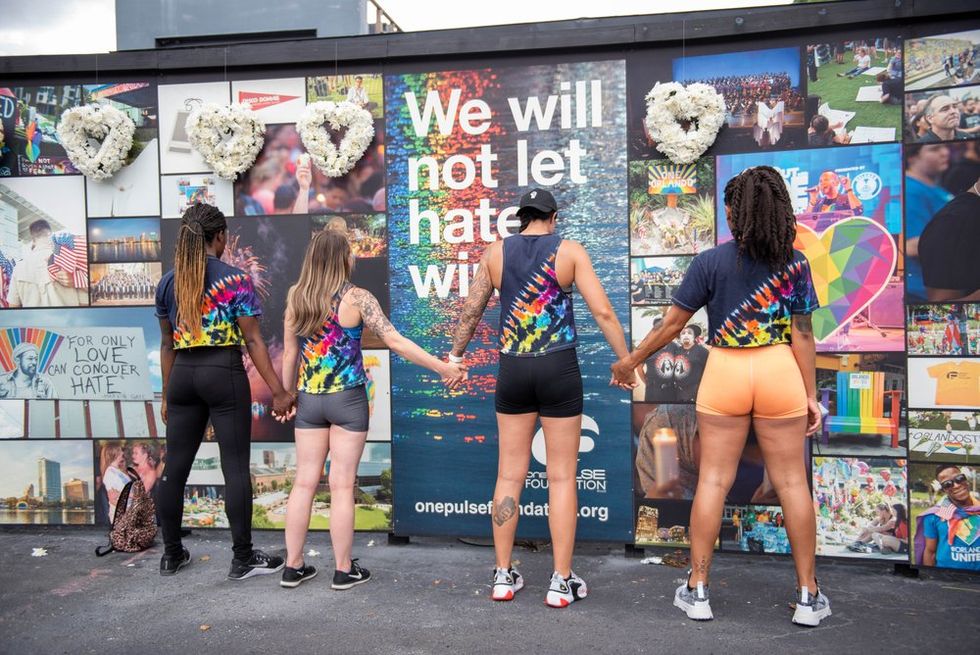
Mourners pay their respects to the fallen at the Pulse Nightclub memorial on the 5th anniversary of the Pulse mass shooting in Orlando, Florida (June 12, 2021)
Chris_Harris / Shutterstock.com
Nondiscrimination laws: Florida has nondiscrimination laws in employment, housing, and public accommodations, but not in credit/lending, health care, nor education. The state prohibits transgender people from using public facilities that align with their identities, and it does not allow updating gender markers on driver's licenses or birth certificates. It has law about "adult" performances that could be used to target or restrict drag
Marriage equality and parental rights: Florida does not have adoption or foster care nondiscrimination protections for LGBTQ+ parents. It does not have second-parent adoption for unmarried couples, confirmatory adoption, nor recognition for parents using assisted reproductive technologies. It also does not have family leave laws that encompass LGBTQ+ people.
Education and youth policies: Florida originated the "Don't Say Gay" laws restricting discussion of LGBTQ+ identities in classrooms. It has banned trans students from participating in sports or using school facilities based on their identities, and it requires staff to forcibly out LGBTQ+ students to their guardians.
Healthcare access and rights: Florida has banned life-saving gender-affirming care for youth, though it permits the discredited and harmful practice of so-called conversion therapy for youth. Medicaid is forbidden from providing coverage related to gender transition for all ages, and insurance companies are not required to cover fertility treatments. The state also has a "religious exemption" law for healthcare providers.
Criminal justice: Florida's hate crime laws only encompass sexual orientation, not gender identity. It has not banned the so-called "LGBTQ+ panic" defense, and it has an HIV criminalization law.
Idaho
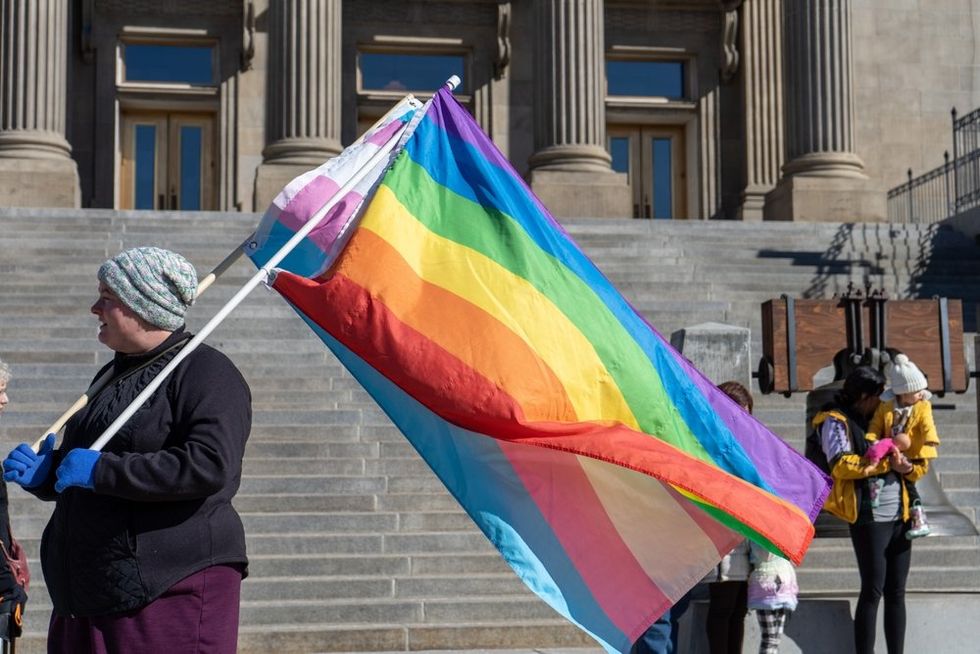
Rally in support of transgender youth and gender-affirming care in Boise, Idaho (February 24, 2023)
Venture Out Media / Shutterstock.com
Nondiscrimination laws: Idaho has nondiscrimination laws in employment, housing, and public accommodations, but not in credit/lending, education, health care, nor for state employees. Its state code incorrectly defines sex as exclusively male or female.
Marriage equality and parental rights: Idaho does not have adoption or foster care nondiscrimination protections for LGBTQ+ parents. It has second-parent adoption for unmarried couples, but not confirmatory adoption nor recognition for parents using assisted reproductive technologies. It also does not have family leave laws that encompass LGBTQ+ people.
Education and youth policies: Idaho has a "Don't Say Gay" law restricting discussion of LGBTQ+ identities in classrooms. It has banned trans students from participating in sports or using school facilities based on their identities, and it requires staff to forcibly out LGBTQ+ students to their guardians. The state also has a "religious exemption" law for Child Welfare Services, though it has protections for LGBTQ+ youth in the Child Welfare System.
Healthcare access and rights: Idaho has banned life-saving gender-affirming care for youth, though it permits the discredited and harmful practice of so-called conversion therapy for youth. Medicaid is forbidden from providing coverage related to gender transition for all ages, and insurance companies are not required to cover fertility treatments. The state also has a "religious exemption" law for healthcare providers.
Criminal justice: Idaho's hate crime laws do not encompass sexual orientation and gender identity. It has not banned the so-called "LGBTQ+ panic" defense, and it has an HIV criminalization law.
Indiana
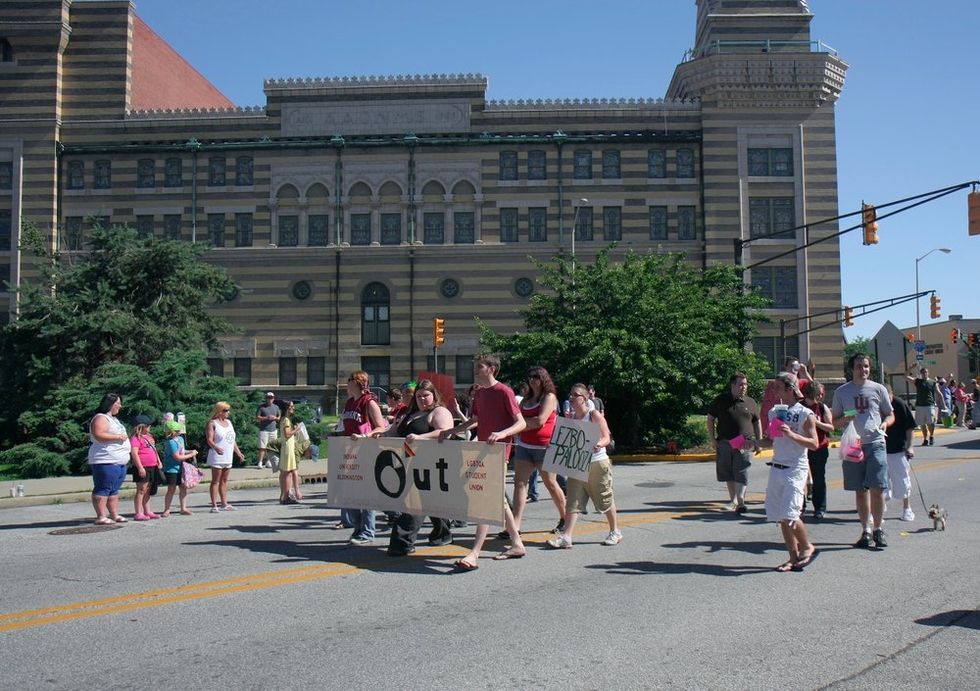
Indiana University Bloomington Students walking at Indy Pride in Indianapolis, Indiana (June 4, 2008)
Umut Tolga Pehlivan / Shutterstock.com
Nondiscrimination laws: Indiana has weaker nondiscrimination laws in employment, housing, and public accommodations, but not in credit/lending, education, nor health care. The state also has a broad "religious exemption" law.
Marriage equality and parental rights: Indiana has adoption or foster care nondiscrimination protections based on sexual orientation, but not gender identity. It has second-parent adoption for unmarried couples, but not confirmatory adoption nor recognition for parents using assisted reproductive technologies. It also does not have family leave laws that encompass LGBTQ+ people.
Education and youth policies: Indiana has a "Don't Say Gay" law restricting discussion of LGBTQ+ identities in classrooms. It has banned trans students from participating in sports or using school facilities based on their identities, and it requires staff to forcibly out LGBTQ+ students to their guardians.
Healthcare access and rights: Indiana has banned life-saving gender-affirming care for youth, though it permits the discredited and harmful practice of so-called conversion therapy for youth. Medicaid and state health insurance plans are forbidden from providing coverage for gender transition treatments.
Criminal justice: Indiana's hate crime laws do not encompass sexual orientation and gender identity, and it has not banned the so-called "LGBTQ+ panic" defense. It has an HIV criminalization law that may require sex offender registration.
Louisiana
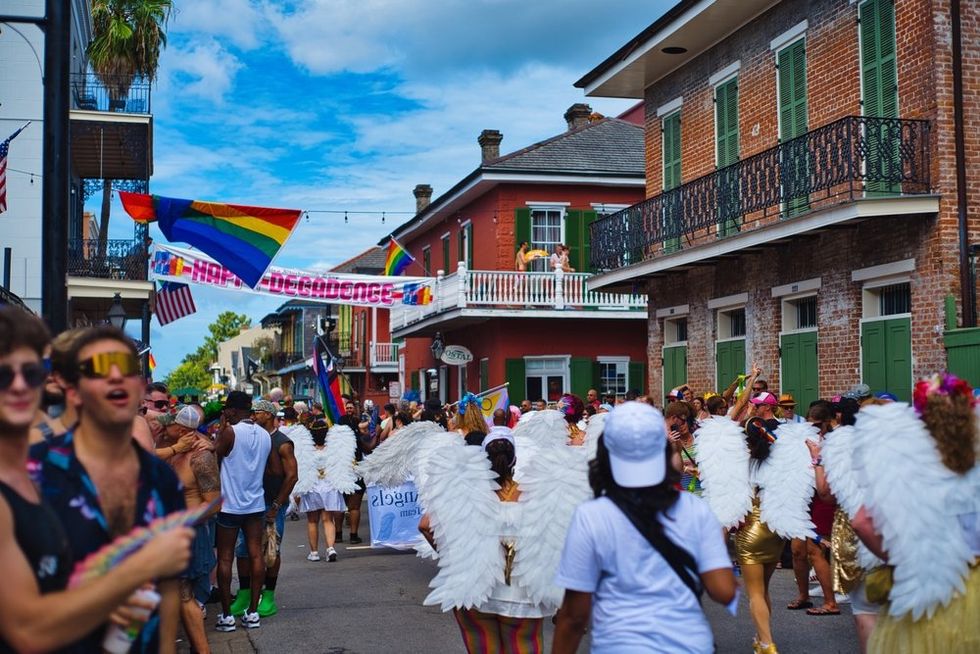
Southern Decadence Parade march through the French Quarter in New Orleans, Louisiana (September 1, 2024)
Scott Colesby / Shutterstock.com
Nondiscrimination laws: Louisiana does not have nondiscrimination laws in employment, housing, health care, education, public accommodations, or credit/lending. Its state code incorrectly defines sex as exclusively male or female, and it prohibits transgender people from using public facilities that align with their identities. The state also has a broad "religious exemption" law permitting LGBTQ+ discrimination.
Marriage equality and parental rights: Louisiana does not have adoption or foster care nondiscrimination protections for LGBTQ+ parents. It does not have second-parent adoption for unmarried couples, confirmatory adoption, nor recognition for parents using assisted reproductive technologies. It also does not have family leave laws that encompass LGBTQ+ people.
Education and youth policies: Louisiana has a "Don't Say Gay" law restricting discussion of LGBTQ+ identities in classrooms. It has banned trans students from participating in sports or using school facilities based on their identities, and it requires staff to forcibly out LGBTQ+ students to their guardians.
Healthcare access and rights: Louisiana has banned life-saving gender-affirming care for youth, though it permits the discredited and harmful practice of so-called conversion therapy for youth. Health insurance companies, including Medicaid, are not required to provide coverage related to gender transition or fertility treatments, and state employees do not have trans-inclusive benefits.
Criminal justice: Louisiana's hate crime laws only encompass sexual orientation, not gender identity. It has not banned the so-called "LGBTQ+ panic" defense, and it has an HIV criminalization law that may require sex offender registration.
Mississippi
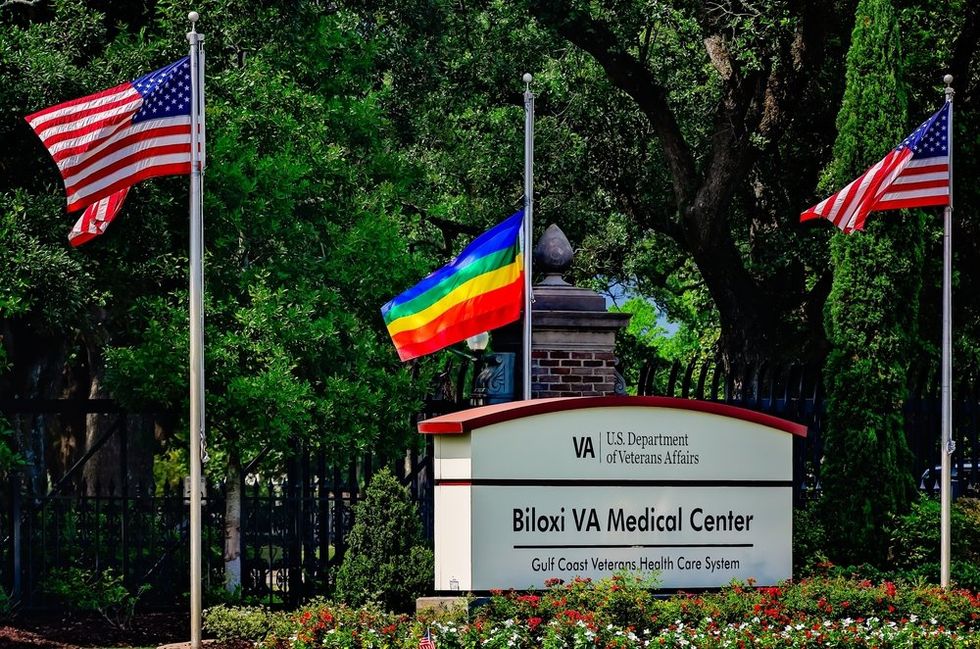
A rainbow flag supporting Pride month flies a the Biloxi VA Medical Center in Biloxi, Mississippi (June 5, 2023)
Carmen K. Sisson / Shutterstock.com
Nondiscrimination laws: Mississippi does not have nondiscrimination laws in employment, housing, health care, education, public accommodations, or credit/lending. Its state code incorrectly defines sex as exclusively male or female, and it prohibits transgender people from using public facilities that align with their identities. The state also has a broad "religious exemption" law.
Marriage equality and parental rights: Mississippi does not have adoption or foster care nondiscrimination protections for LGBTQ+ parents. It has second-parent adoption for unmarried couples, but not confirmatory adoption nor recognition for parents using assisted reproductive technologies. It also does not have family leave laws that encompass LGBTQ+ people.
Education and youth policies: Mississippi has a "Don't Say Gay" law restricting discussion of LGBTQ+ identities in classrooms. It has banned trans students from participating in sports or using school facilities based on their identities, and it requires staff to forcibly out LGBTQ+ students to their guardians. The state also has a "religious exemption" law for Child Welfare Services.
Healthcare access and rights: Mississippi has banned life-saving gender-affirming care for youth, though it permits the discredited and harmful practice of so-called conversion therapy for youth. Medicaid is forbidden from providing coverage related to gender transition for youth, and insurance companies are not required to cover fertility treatments. The state also has a "religious exemption" law for healthcare providers.
Criminal justice: Mississippi's hate crime laws do not encompass sexual orientation and gender identity. It has not banned the so-called "LGBTQ+ panic" defense, and it has an HIV criminalization law.
Missouri
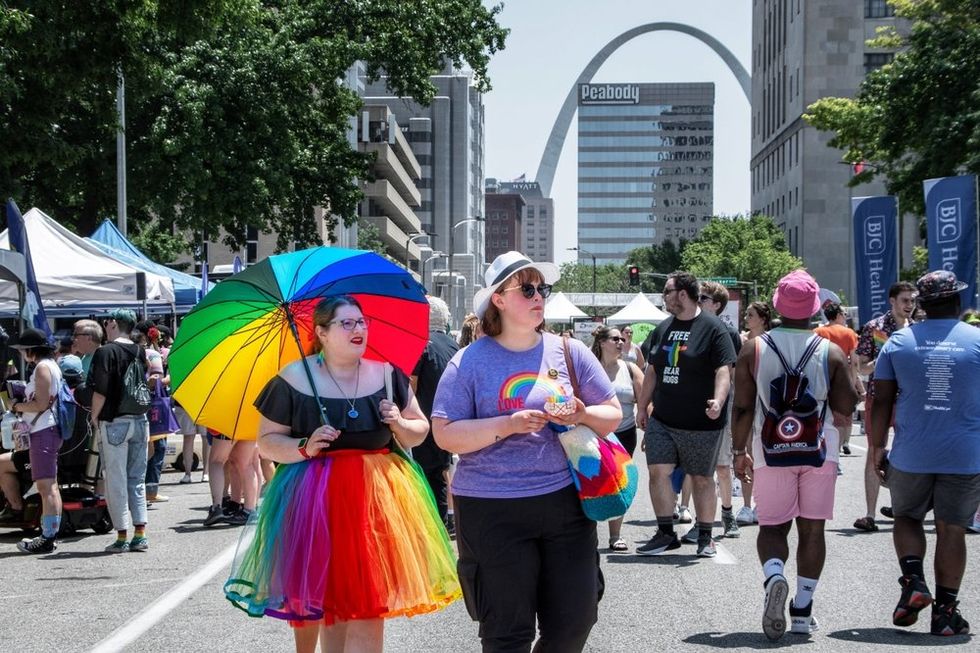
A view down one of the streets filled with celebrants during Saint Louis PrideFest in Missouri (June 24, 2023)
Ryanzo W. Perez / Shutterstock.com
Nondiscrimination laws: Missouri has weaker nondiscrimination laws in housing, and public accommodations, but not in employment, credit/lending, education, nor health care. The state also has a broad "religious exemption" law.
Marriage equality and parental rights: Missouri's adoption or foster care nondiscrimination protections only encompass sexual orientation, not gender identity. It does not have second-parent adoption for unmarried couples, confirmatory adoption, nor recognition for parents using assisted reproductive technologies. It also does not have family leave laws that encompass LGBTQ+ people.
Education and youth policies: Missouri has banned schools and districts from passing nondiscrimination or anti-bullying policies protecting LGBTQ+ students. It has banned trans students from participating in sports based on their identities, but not from using facilities that align with their identities.
Healthcare access and rights: Missouri has banned life-saving gender-affirming care for youth, though it permits the discredited and harmful practice of so-called conversion therapy for youth. Medicaid is forbidden from providing coverage related to gender transition for all ages, and insurance companies are not required to cover fertility treatments. The state also has a "religious exemption" law for healthcare providers.
Criminal justice: Missouri's hate crime laws encompass sexual orientation and gender identity, though it has not banned the so-called "LGBTQ+ panic" defense, and it has an HIV criminalization law.
Montana
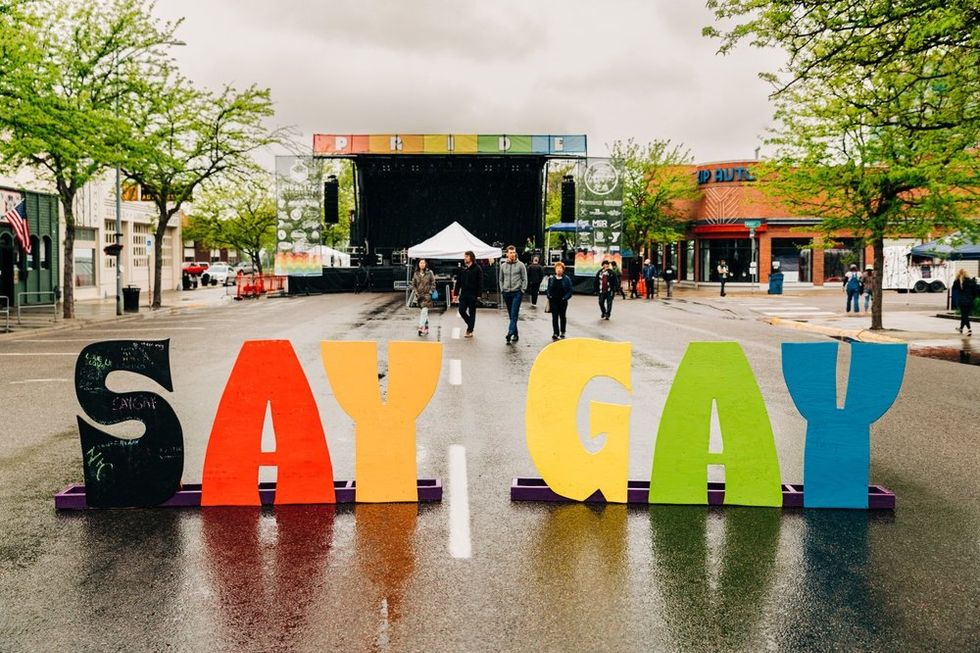
"Say Gay" sign at Missoula Pride in Montana (March 29, 2024)
Cavan-Images / Shutterstock.com
Nondiscrimination laws: Montana does not have nondiscrimination laws in employment, housing, health care, education, public accommodations, or credit/lending. Its state code incorrectly defines sex as exclusively male or female, and it has a broad "religious exemption" law. The state has also explicitly restricted drag performances, and does not allow updating gender markers on birth certificates
Marriage equality and parental rights: Montana's adoption or foster care nondiscrimination protections only encompass sexual orientation, not gender identity. It has second-parent adoption for unmarried couples, but not confirmatory adoption nor recognition for parents using assisted reproductive technologies. It also does not have family leave laws that encompass LGBTQ+ people.
Education and youth policies: Montana requires that parents be notified of LGBTQ+ curricula so they can opt out. It has banned trans students from participating in sports based on their identities, but not from using facilities that align with their identities. The state requires staff to forcibly out LGBTQ+ students to their guardians.
Healthcare access and rights: Montana has banned life-saving gender-affirming care for youth, though it permits the discredited and harmful practice of so-called conversion therapy for youth. Health insurance companies and Medicaid are required to cover care related to gender transition, as well as detransition treatment, and there is some coverage for fertility treatments. The state allows allows those who regret transitioning to sue their doctors, and has a "religious exemption" law for healthcare providers.
Criminal justice: Montana's hate crime laws do not encompass sexual orientation and gender identity. It has not banned the so-called "LGBTQ+ panic" defense, and it has an HIV criminalization law.
Oklahoma
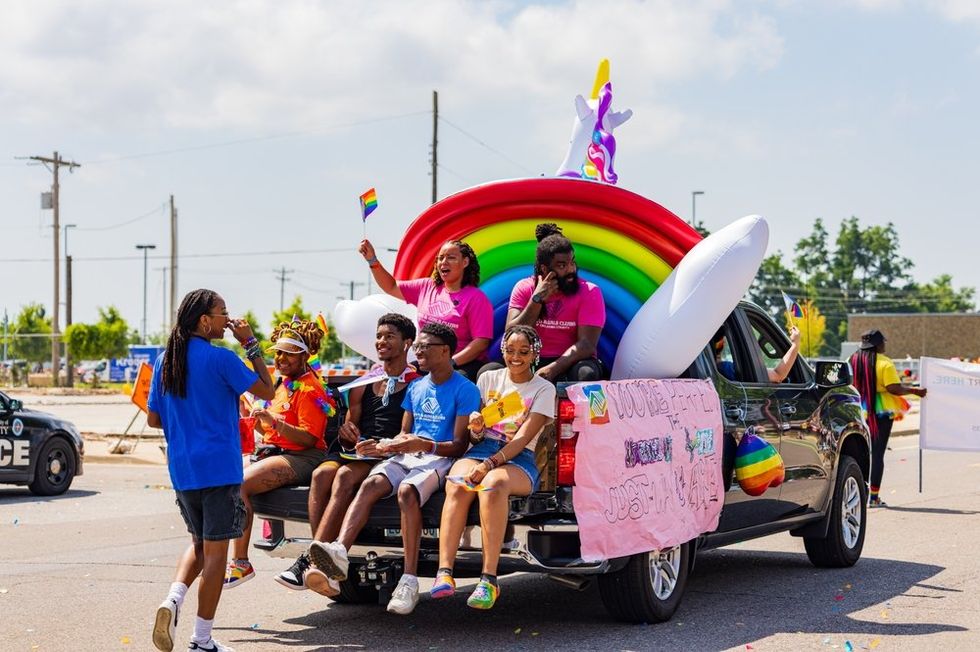
Pride Parade in Oklahoma (June 26, 2023)
Kit Leong / Shutterstock.com
Nondiscrimination laws: Oklahoma does not have nondiscrimination laws in employment, housing, health care, education, public accommodations, or credit/lending. Its state code incorrectly defines sex as exclusively male or female, and it prohibits updated gender markers on birth certificates. It also has a broad "religious exemption" law.
Marriage equality and parental rights: Oklahoma does not have adoption or foster care nondiscrimination protections for LGBTQ+ parents. It has second-parent adoption for unmarried couples, but not confirmatory adoption nor recognition for parents using assisted reproductive technologies. It also does not have family leave laws that encompass LGBTQ+ people.
Education and youth policies: Oklahoma has a weaker version of a "Don't Say Gay" law that restricts the discussion of "homosexuality" in specific school subjects. It has banned trans students from participating in sports or using school facilities based on their identities. The state also has a "religious exemption" law for Child Welfare Services, and allows anti-LGBTQ+ parents to foster LGBTQ+ children,
Healthcare access and rights: Oklahoma has banned life-saving gender-affirming care for youth, though it permits the discredited and harmful practice of so-called conversion therapy for youth. Health insurance companies, including Medicaid, are not required to provide coverage related to gender transition or fertility treatments, and state employees are not permitted trans-inclusive benefits.
Criminal justice: Oklahoma's hate crime laws do not encompass sexual orientation and gender identity. It has not banned the so-called "LGBTQ+ panic" defense, and it has an HIV criminalization law.
South Carolina
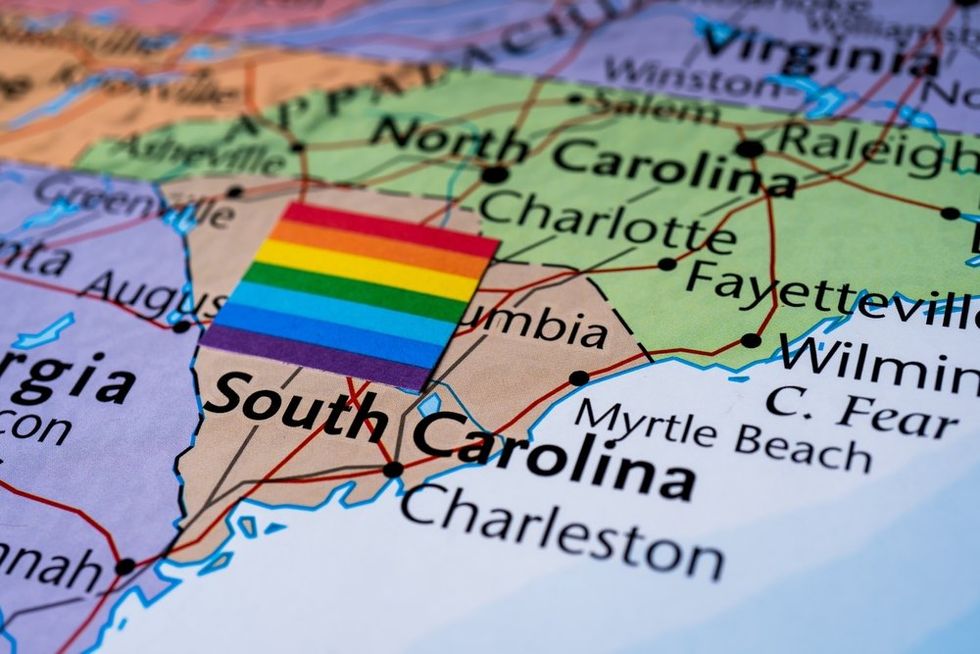
Rainbow flag on a map of South Carolina
Shuttershock creative
Nondiscrimination laws: South Carolina does not have nondiscrimination laws in employment, housing, health care, education, public accommodations, or credit/lending. It has a broad "religious exemption" law.
Marriage equality and parental rights: South Carolina's adoption or foster care nondiscrimination protections only encompass sexual orientation, not gender identity. It does not have second-parent adoption for unmarried couples, confirmatory adoption, nor recognition for parents using assisted reproductive technologies. It also does not have family leave laws that encompass LGBTQ+ people.
Education and youth policies: South Carolina has banned trans students from participating in sports based on their identities, but not from using facilities that align with their identities. The state requires staff to forcibly out LGBTQ+ students to their guardians. The state also has a "religious exemption" law for Child Welfare Services.
Healthcare access and rights: South Carolina has banned life-saving gender-affirming care for youth, though it permits the discredited and harmful practice of so-called conversion therapy for youth. Medicaid is forbidden from providing coverage related to gender transition for all ages, and insurance companies are not required to cover fertility treatments. The state also has a "religious exemption" law for healthcare providers.
Criminal justice: South Carolina's hate crime laws do not encompass sexual orientation and gender identity. It has not banned the so-called "LGBTQ+ panic" defense, and it has an HIV criminalization law.
South Dakota
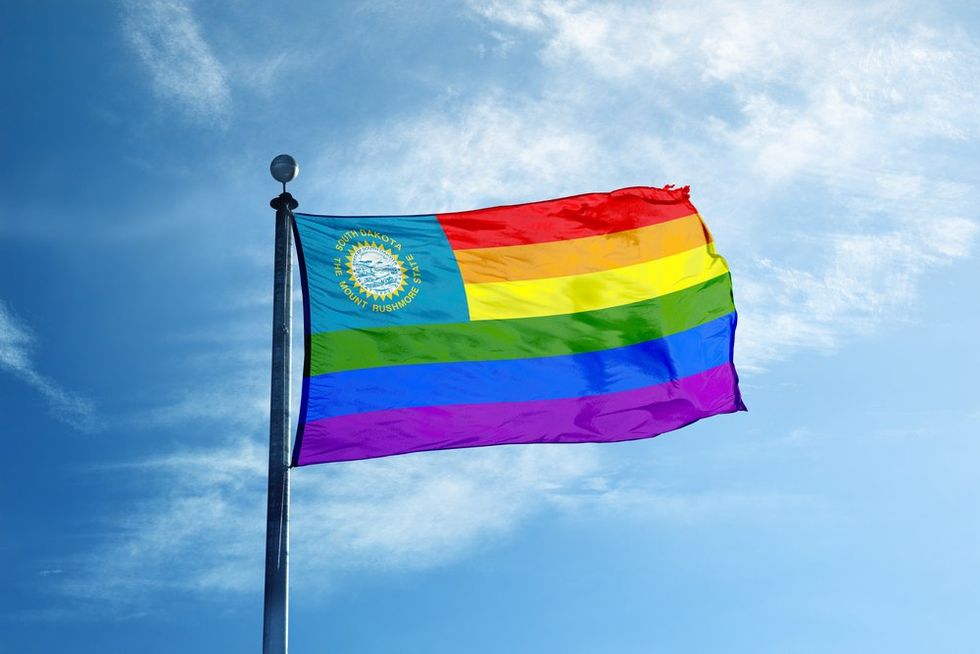
South Dakota state flag with rainbow stripes
Shuttershock creative
Nondiscrimination laws: South Dakota does not have nondiscrimination laws in employment, housing, health care, education, public accommodations, or credit/lending. It has a broad "religious exemption" law.
Marriage equality and parental rights: South Dakota's adoption or foster care nondiscrimination protections encompass sexual orientation and gender identity. However, it does not have second-parent adoption for unmarried couples, confirmatory adoption, nor recognition for parents using assisted reproductive technologies. It also does not have family leave laws that encompass LGBTQ+ people.
Education and youth policies: South Dakota has banned schools and districts from passing nondiscrimination or anti-bullying policies protecting LGBTQ+ students. It has banned trans students from participating in sports based on their identities and from using facilities that align with their identities. The state also has a "religious exemption" law for Child Welfare Services, though it has protections for LGBTQ+ youth in the Child Welfare System.
Healthcare access and rights: South Dakota has banned life-saving gender-affirming care for youth, though it permits the discredited and harmful practice of so-called conversion therapy for youth. Health insurance companies, including Medicaid, are not required to provide coverage related to gender transition or fertility treatments, and state employees are not permitted trans-inclusive benefits.
Criminal justice: South Dakota's hate crime laws do not encompass sexual orientation and gender identity, and it has not banned the so-called "LGBTQ+ panic" defense. It has an HIV criminalization law that may require sex offender registration.
Tennessee
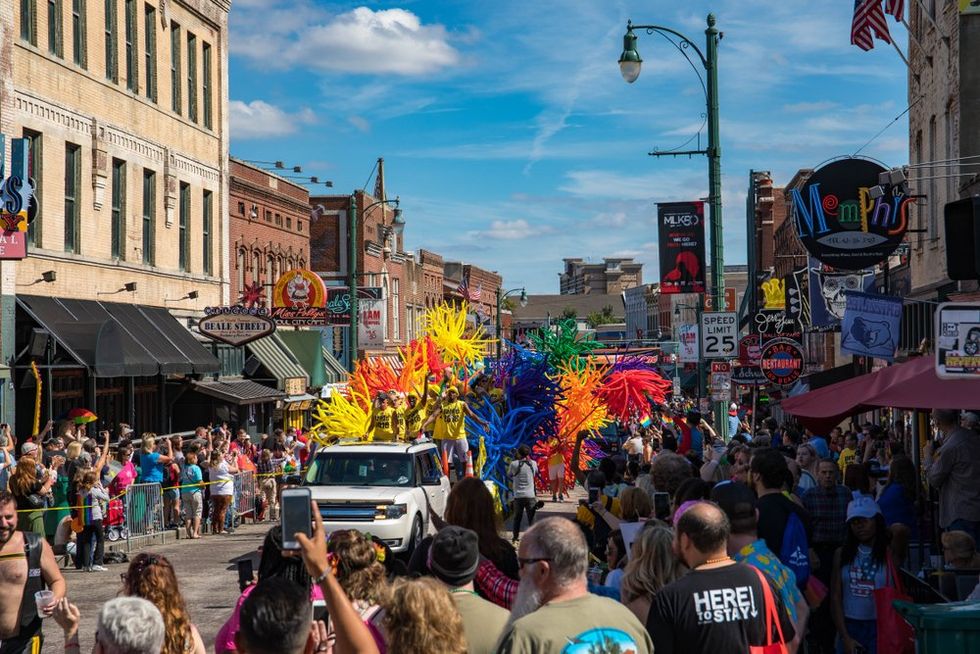
Pride Parade on Beale Street in Memphis, Tennessee (September 28, 2018)
evenfh / Shutterstock.com
Nondiscrimination laws: Tennessee does not have nondiscrimination laws in employment, housing, health care, education, public accommodations, or credit/lending. It instead bans cities and local ordinances from passing nondiscrimination laws. State code incorrectly defines sex as exclusively male or female, and it does not allow updating gender markers on driver's licenses or birth certificates. The state has a broad "religious exemption" law that even allows officials to deny marriage licenses based on their personal beliefs. It has also explicitly restricted drag performances.
Marriage equality and parental rights: Tennessee's adoption or foster care nondiscrimination protections encompass sexual orientation and gender identity. However, it does not have second-parent adoption for unmarried couples, confirmatory adoption, nor recognition for parents using assisted reproductive technologies. It also does not have family leave laws that encompass LGBTQ+ people.
Education and youth policies: Tennessee requires that parents be notified of LGBTQ+ curricula so they can opt out. It has banned trans students from participating in sports based on their identities and from using facilities that align with their identities. The state requires staff to forcibly out LGBTQ+ students to their guardians and allows teachers to misgender trans students. The state also has a "religious exemption" law for Child Welfare Services, though it has protections for LGBTQ+ youth in the Child Welfare System.
Healthcare access and rights: Tennessee has banned life-saving gender-affirming care for youth, though it permits the discredited and harmful practice of so-called conversion therapy for youth. Medicaid is forbidden from providing coverage related to gender transition for all ages, and insurance companies are not required to cover fertility treatments. The state also has a "religious exemption" law for healthcare providers, and state employees are not permitted trans-inclusive benefits.
Criminal justice: Tennessee's hate crime laws encompass sexual orientation and gender identity, though it has not banned the so-called "LGBTQ+ panic" defense, and it has an HIV criminalization law that may require sex offender registration.
Texas
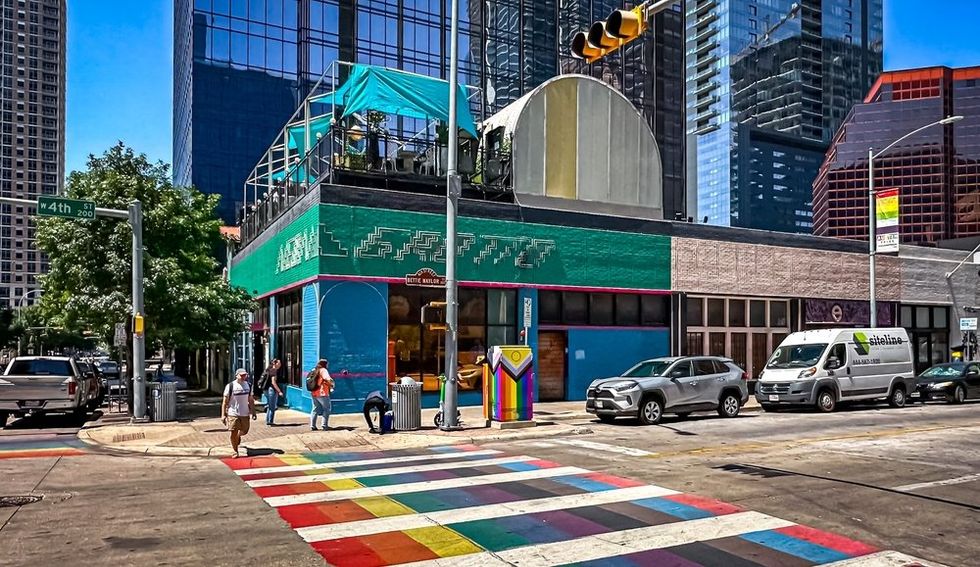
Rainbow crosswalk outside Neon Grotto nightclub in Austin, Texas (May 29, 2024)
eric laudonien / Shutterstock.com
Nondiscrimination laws: Texas has nondiscrimination laws in employment and for state employees, but not in housing, public accommodations, credit/lending, education, nor health care. The state does not allow updating gender markers on driver's licenses or birth certificates, has a broad "religious exemption" law, and incorrectly defines sex as unchanging and exclusively male or female.
Marriage equality and parental rights: Texas does not have adoption or foster care nondiscrimination protections for LGBTQ+ parents. It does not have second-parent adoption for unmarried couples, confirmatory adoption, nor recognition for parents using assisted reproductive technologies. It also does not have family leave laws that encompass LGBTQ+ people.
Education and youth policies: Texas has a weaker version of a "Don't Say Gay" law that restricts the discussion of "homosexuality" in specific school subjects. It has banned trans students from participating in sports based on their identities, and requires parental permission for students to go by a different name or pronouns. The state also has a "religious exemption" law for Child Welfare Services without protections for LGBTQ+ youth.
Healthcare access and rights: Texas has banned life-saving gender-affirming care for youth, though it permits the discredited and harmful practice of so-called conversion therapy for youth. Medicaid is forbidden from providing coverage related to gender transition for all ages, and insurance companies are not required to cover fertility treatments. State employees are not permitted trans-inclusive benefits.
Criminal justice: Texas's hate crime laws only encompass sexual orientation, not gender identity. It has not banned the so-called "LGBTQ+ panic" defense.
Wyoming

Double rainbow against a black sky in Wyoming
Shuttershock creative
Nondiscrimination laws: Wyoming does not have nondiscrimination laws in employment, housing, health care, education, public accommodations, or credit/lending. It instead has a broad "religious exemption law" that could deny housing, healthcare, and equal pay to LGBTQ+ people. The state code incorrectly defines sex as unchanging and exclusively male or female.
Marriage equality and parental rights: Wyoming does not have adoption or foster care nondiscrimination protections for LGBTQ+ parents. It does not have second-parent adoption for unmarried couples, nor confirmatory adoption. It also does not have family leave laws that encompass LGBTQ+ people. However, it does have recognition for parents using assisted reproductive technologies.
Education and youth policies: Wyoming has a weaker version of a "Don't Say Gay" law that restricts the discussion of "homosexuality" in specific school subjects, and prohibits state employees (including teachers) from affirming someone's gender identity through names and pronouns. It has banned trans students from participating in sports based on their identities and from using facilities that align with their identities.
Healthcare access and rights: Wyoming has banned life-saving gender-affirming care for youth, though it permits the discredited and harmful practice of so-called conversion therapy for youth. Health insurance companies, including Medicaid, are not required to provide coverage related to gender transition or fertility treatments.
Criminal justice: Wyoming's hate crime laws do not encompass sexual orientation and gender identity, and it has not banned the so-called "LGBTQ+ panic" defense.
Dishonorable mentions
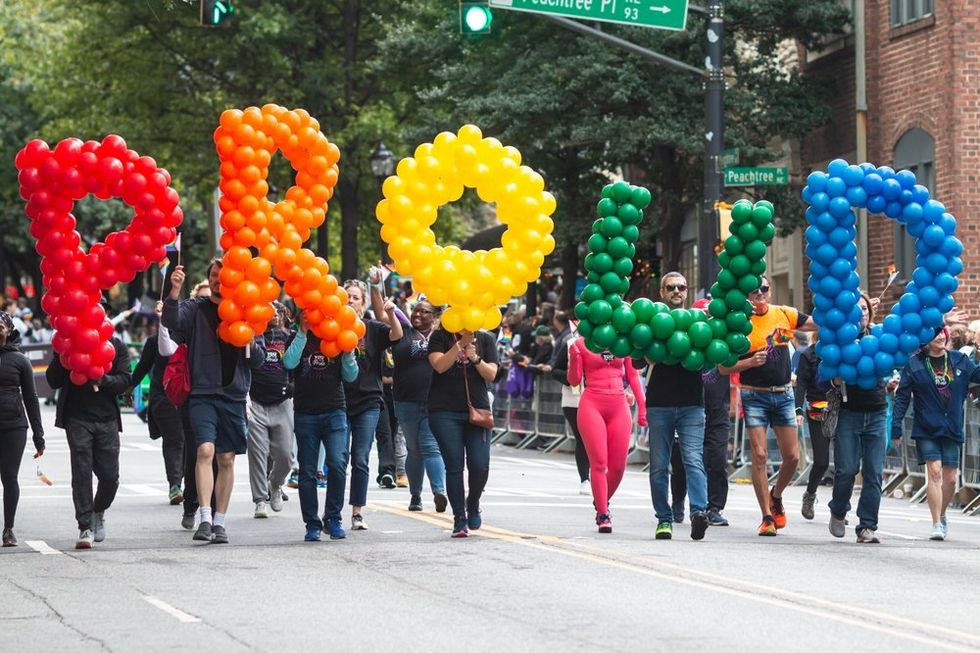
People carry large balloon letters that spell out "Proud" as they walk in the annual pride parade in Atlanta, Georgia (October 15, 2023)
BluIz70 / Shutterstock.com
Other states that ranked below average include: Alaska, Arizona, Georgia, Iowa, Kansas, Kentucky, Nebraska, North Carolina, North Dakota, Ohio, Utah, and West Virginia.





